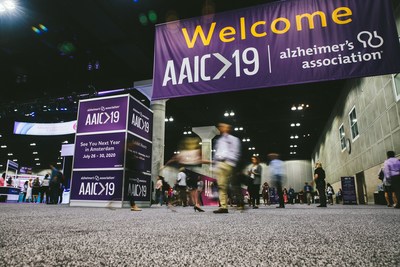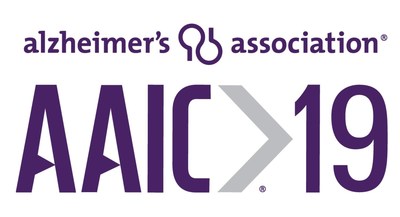

International Conference Also Included Expert Discussion on Role of Infectious Agents in Alzheimer's Disease, and Advances Towards a Blood Test
LOS ANGELES, July 17, 2019 /PRNewswire/ -- Research presented at the Alzheimer's Association International Conference (AAIC) 2019 in Los Angeles suggests adopting multiple healthy lifestyle habits provides high levels of benefit for brain health, and may offset genetic and environmental risks of Alzheimer's disease and other dementias.

These reports were some of the most promising and hopeful among a record number of scientific studies presented at the conference that use diverse approaches to uncover the causes, progression, risk factors, treatment and prevention of Alzheimer's disease and other dementias.
Other new data presented at the conference included:
As the world's leading forum for discussion of emerging topics in Alzheimer's and dementia research, AAIC 2019 hosted a panel discussion of five expert speakers with differing views on the role of bacterial or viral infection in Alzheimer's disease.
"While the field continues to work toward developing treatments for Alzheimer's and other dementias, it's also important to identify lifestyle changes that people can make to improve the symptoms or progression of these diseases and new targets for treatment," said Maria C. Carrillo, PhD, Alzheimer's Association chief science officer.
"The clinical trial data presented at AAIC this year reflects the diversity of approaches being used to develop treatments for Alzheimer's. It's critical that the field pursue new avenues of research to provide better treatments for the millions of people living with these diseases," Carrillo added.
AAIC is the premier annual forum for presentation and discussion of the latest Alzheimer's and dementia research. Bringing the world closer to breakthroughs in dementia science, AAIC 2019 convened approximately 6,000 leading experts and researchers from around the world and featured more than 3,400 scientific presentations.
Lifestyle Interventions Can Offset Elevated Alzheimer's Risk
New research reported at AAIC 2019 suggests that adopting multiple healthy lifestyle choices, including healthy diet, not smoking, regular exercise and cognitive stimulation, may decrease the risk of cognitive decline and dementia. One study reported that participants who adopted four or five low-risk lifestyle factors had about 60% lower risk of Alzheimer's dementia compared with participants who did not follow any or only one of the low-risk factors.
Two studies showed that actionable lifestyle changes could potentially counteract elevated risk for Alzheimer's disease. In one report, researchers showed that participants with a high genetic risk for Alzheimer's following a "favorable" lifestyle had a 32% lower risk of all-cause dementia compared with an "unfavorable" lifestyle. Another report confirmed that living in locations with high air pollution increased the risk for Alzheimer's and other dementias. However, it also found that older women with higher cognitive reserve – based on cognitive function scores, years of education, job status and physical activity – only showed a 21% increased environmental risk compared with a 113% increased risk for those with lower cognitive reserve.
Blood Markers Could Improve Diagnosis of Alzheimer's
Data at AAIC 2019 also described advances in blood-based methods for evaluating markers of Alzheimer's and other neurodegenerative diseases, such as abnormal versions of amyloid protein, which is important in Alzheimer's, as well as alpha synuclein (dementia with Lewy Bodies) and neurofilament light (general brain cell damage).
There is a great need for reliable, inexpensive, easy to administer, non-invasive and easily available diagnostic tools for Alzheimer's. Families facing Alzheimer's now and in the future would benefit greatly from such tools that could accelerate diagnosis earlier in the disease process, and allow for improved and accelerated delivery of care and planning. These new testing technologies, which are currently under development by industry and academic researchers, could also potentially be used to track the impact of therapies in clinical trials.
Alzheimer's Risk, Progression and Resilience Differs by Sex
Research at AAIC 2019 also identified several differences in the biology, progression and risk of Alzheimer's disease between men and women. Four studies reported on sex-specific differences that could inform unique risk profiles and help the field better understand why the majority of people living with Alzheimer's are women.
Two studies found 11 novel sex-specific risk genes for Alzheimer's disease, as well as differences in the structural and functional connections in the brains of women that might contribute to accelerated spread of abnormal tau protein, which tracks closely with cognitive decline in Alzheimer's and other dementias. Another study suggests that women have higher levels of brain energy usage than men, potentially explaining better verbal memory and enabling them to better compensate for early Alzheimer's-related brain changes.
A fourth study found that women who participated in the paid labor force between early adulthood and middle age showed slower rates of memory decline in late-life compared with those who did not engage in waged employment.
New Alzheimer's Clinical Trials Test Novel Treatment Approaches
At AAIC 2019, researchers reported 18-month results from the open-label extension of the SNIFF trial, a Phase 2/3 trial evaluating the use of intranasal insulin for people with mild cognitive impairment or Alzheimer's disease. The study found that, for a group of just over 40 participants whose used the original drug delivery device, those treated with insulin had significantly better cognitive and functional test scores compared with those who received placebo. However, this was not observed in a group that used a different intranasal delivery device. While encouraging, follow up studies are needed.
Another study reported on the initiation of the GAIN trial, a large Phase 2/3 study in mild to moderate Alzheimer's. The study is the first large, international trial to evaluate a therapeutic approach based on emerging data that suggest the bacterium Porphyromonas gingivalis, commonly associated with gum disease, can infect the brain and lead to Alzheimer's disease. The GAIN trial has begun enrolling 570 patients in the United States and Europe.
AAIC 2019 also reported on the Alzheimer's Association's U.S. Study to Protect Brain Health Through Lifestyle Intervention to Reduce Risk (U.S. POINTER), a two-year randomized controlled trial to evaluate whether lifestyle interventions that simultaneously target many risk factors can protect cognitive function in older adults who are at increased risk for cognitive decline. U.S. POINTER, now active at four sites in the U.S. with a fifth launching soon, plans to enroll 2,000 participants aged 60-79 years.
Expert Panel Discusses Role of Infectious Agents in Alzheimer's Disease
AAIC 2019 hosted a panel titled "Emerging Concepts in Basic Science Series: Is There a Causative Role for Infectious Organisms in Alzheimer's Disease?" in which several experts in the field shared differing views on the role of infectious agents in Alzheimer's.
About AAIC
The Alzheimer's Association International Conference (AAIC) is the world's largest gathering of researchers from around the world focused on Alzheimer's and other dementias. As a part of the Alzheimer's Association's research program, AAIC serves as a catalyst for generating new knowledge about dementia and fostering a vital, collegial research community.
AAIC 2019 home page: www.alz.org/aaic/
AAIC 2019 newsroom: www.alz.org/aaic/press.asp
About the Alzheimer's Association®
The Alzheimer's Association is the leading voluntary health organization in Alzheimer's care, support and research. Our mission is to eliminate Alzheimer's disease through the advancement of research, to provide and enhance care and support for all affected, and to reduce the risk of dementia through the promotion of brain health. Our vision is a world without Alzheimer's. Visit alz.org or call 800.272.3900.

SOURCE Alzheimer's Association
